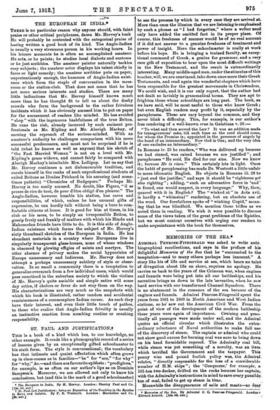THE EUROPEAN IN INDIA.° THERE is no particular reason why
anyone should, with faint praise or other critical periphrases, damn Mr. Hervey's book He will probably be contented with the categorical praise of having written a good book of its kind. The Anglo-Indian is usually a very strenuous person in his working hours. In his leisure moments he is often an accomplished amateur. He acts, or he paints; he studies local dialects and customs or he just scribbles. The amateur painter naturally tackles easy subjects ; the amateur actor displays his talent chiefly in farce or light comedy ; the amateur scribbler puts on paper, unpretentiously enough, the humours of Anglo-Indian exist- ence which form the staple of conversation in the mess- room or the station-club. That does not mean that he has not more serious interests and studies. There are many little indications that Mr. Hervey himself knows much more than he has thought fit to tell us about the dusky crowds who form the background to the rather frivolous incidents which it has obviously amused him to put on paper for the amusement of readers like minded. He has avoided " shop" with the ingenuous bashfulness of the true Briton. He runs the risk, already incurred by such eminent pro- fessionals as Mr. Kipling and Mr. Aberigh Mackay, of earning the reproach of the serious-minded. With an amateur's audacity be challenges comparison with his more successful predecessors, and must not be surprised if he is told (what he knows as well as anyone) that his sketch of "the Fast Married Woman" is not on a level with Mr. Kipling's grass widows, and cannot fairly be compared with Aberigh Mackay's inimitable Mrs. Lollipop. Let us say that Mr. Hervey continues a not dishonourable tradition, and enrols himself in the ranks of such unprofessional students of exiled Britons as Iltudus Prichard in his amusing (and some- times pathetic) " Chronicles of Budgepore." Perhaps Mr. Hervey is too easily amused. No doubt, like Figaro, " it se presse de rice de tout, de pear d'etre oblige d'en plehrer." The Anglo-Indian, however humble his station, has cares and responsibilities, of which, unless he has unusual gifts of expression, he can hardly talk without being a bore to com- fortable citizens at home. It is good for him at times, in his club or his mess, to be simply an irresponsible Briton, to gossip freely and frankly of matters with which his Hindu and Mahomedan friends have little to do. It is this side of Anglo- Indian existence which forma the subject of Mr. Hervey's sixty thumbnail sketches of the European in India. He has abundant materials in a country where Europeans live in singularly transparent glass-houses, none of whose windows is obscured by glowing effigies of saints and martyrs. The utter absence of privacy makes the social hypocrisies of Europe unnecessary and ludicrous. Mr. Hervey does not attempt a perhaps unnecessary subtlety of style or obser- vation. In so small a community there is a temptation to generalize overmuch from a few individual cases, which would pass unnoticed in the suburban society to which the victims of Mr. Hervey's quite amiable and simple satire will some day retire, if cholera or fever do not stay them on the way. His characterizations are very much as the snapshots with which his book is illustrated, rather random and accidental reminiscences of a commonplace Indian career. As such they have their interest, and even their little touch of pathos, to those who realize that Anglo-Indian frivolity is usually an instinctive reaction from numbing routine or crushing responsibility.














































 Previous page
Previous page